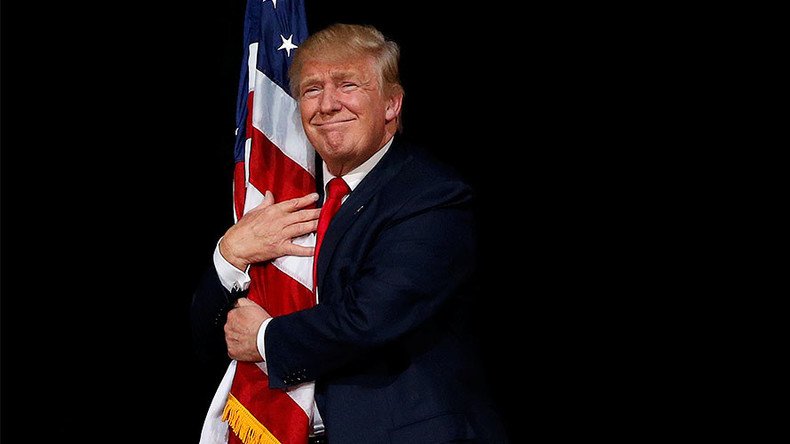Trump’s proposal to strip flag-burners of citizenship sets Twitter ablaze

President-elect Donald Trump has stirred up a firestorm on social media by suggesting that burning the American flag should be against the law. Critics have condemned the statement as infringing on constitutionally protected free speech.
Early Tuesday morning, Trump tweeted that burning the American flag should be banned and punishable by a year in jail or loss of citizenship.
Nobody should be allowed to burn the American flag - if they do, there must be consequences - perhaps loss of citizenship or year in jail!
— Donald J. Trump (@realDonaldTrump) November 29, 2016
A number of critics took to social media with reminders that burning the flag in protest is considered protected speech under the First Amendment to the US Constitution, as established by two US Supreme Court decisions.
A common argument was that freedom of speech protects both flag-burning and Trump’s tweets.
Burning the flag always struck me as stupid and counterproductive.
— Armando (@armandodkos) November 29, 2016
But if that's not protected by 1st, then neither is Trump's tweets/
I feel the same about Trump's flag burning tweets as I do about flag burning. Both are disgusting, but Constitutionally protected. #1Am
— German Shepherd (@GermanShepher10) November 29, 2016
In 1989’s “Texas v. Johnson” decision, the Supreme Court ruled that flag burning was a form of constitutionally protected “symbolic speech.” The following year, the court reaffirmed the decision by overruling the Flag Protection Act passed by Congress, in the case known as “US v. Eichman.”
Like it or not, burning the American flag is free speech protected by the First Amendment https://t.co/crIdzDo2EP
— ACLU National (@ACLU) November 29, 2016
“Our democracy is strong because we tolerate all peaceful forms of expression, no matter how uncomfortable they make us feel or how much we disagree,” the American Civil Liberties Union (ACLU) said in response to the president-elect’s statement. “We will continue to react quickly and forcefully to any future attempts to restrict the protections of the First Amendment.”
Trump's comments on flag burning are silly and irrelevant. But before going ballistic, Dems should google the Flag Protection Act of 2005.
— Dominick Mastrangelo (@DomMastrangelo1) November 29, 2016
.@emmaroller Agreed, but Hillary Clinton literally sponsored a flag-burning bill w/1 yr jail time & a $100k fine https://t.co/THT20NjPl3
— Bill Humphrey (@BillHumphreyMA) November 29, 2016
Democrats who rushed to protest Trump’s tweet were quickly reminded that Hillary Clinton – whom polls and the media considered a favorite in the November 8 presidential election – sponsored a bill to ban flag-burning in 2005, while serving as a senator from New York.
.@neeratandenpic.twitter.com/E9mo2aKNHL
— Mental Trillness (@lneptChemist) November 29, 2016
Some Trump supporters even suggested that the tweet was a clever ploy to make the president-elect’s critics look foolish.
1. Flag-burning will never be banned.
— Justin Raimondo (@JustinRaimondo) November 29, 2016
2. Trump knows this.
3. Liberals don't & will continue yelping about it.
4. Trump wins.
Populism! https://t.co/XmWnCM97uE
BREAKING: Trump turns the left into Castro mourning flag burners and he's not even president yet.
— eddie (@eddiecarl4468) November 29, 2016
Winning!!
The “Stars and Stripes” flag dates back to 1777, though it has been updated through US history to make the number of stars in the blue field reflect the number of federal states. The current design with 50 stars was adopted in 1959. The flag is considered a symbol deserving of great reverence, with laws governing its proper handling and disposal if damaged.
US schools begin their day by students pledging allegiance to the flag and the American Republic, a ritual that dates back to 1892. The Pledge was officially adopted by Congress in 1942, and updated with the words “under God” in 1954.












